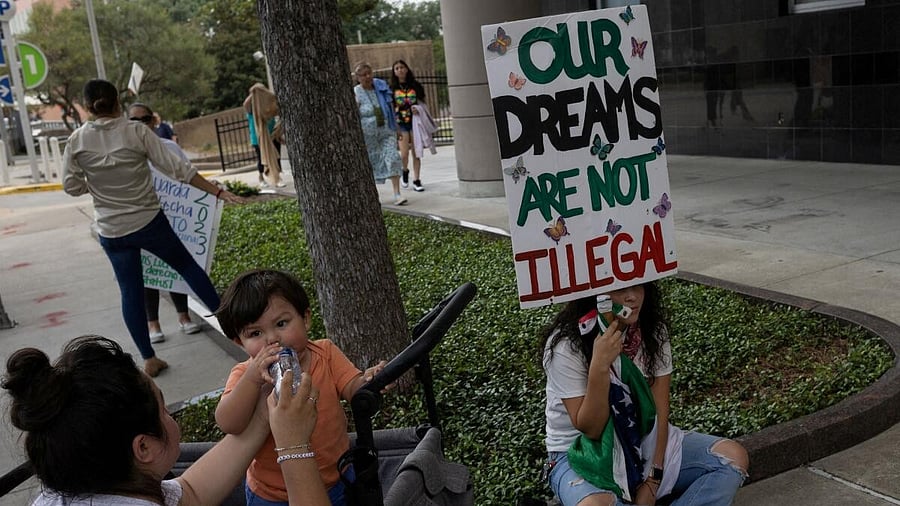
DACA policy supporters gather outside Texas court.
Credit: Reuters photo
A federal appeals court Friday ruled against an Obama-era program that has shielded hundreds of thousands of people in the country without legal permission from deportation. But in its decision on the Deferred Action for Childhood Arrivals program, known as DACA, the three-judge panel stopped short of allowing current beneficiaries to be deported and said it was staying its decision to allow the ruling to be appealed.
The opinion, by the 5th US Circuit Court of Appeals, is the latest legal turn in a long-running fight over the fate of DACA, and it comes just three days before the inauguration of President-elect Donald Trump, who sought to end the program during his first term.
A federal district court in Texas had ruled in 2021 that DACA was unlawful, and that decision was upheld in part by the 5th Circuit in its decision Friday. But the appeals court ruled that an injunction ordered by the lower court for the entire country should instead be limited to Texas, and that current DACA recipients could continue to renew their status nationwide.
"Because Texas is the only plaintiff that has demonstrated or even attempted to demonstrate an actual injury, and because that injury is fully redressable by a geographically limited injunction, we narrow the scope of the injunction to Texas," the ruling said.
The appeals court stayed its ruling, and, therefore, no current beneficiary of DACA is immediately vulnerable to deportation from the country. They will also be able to continue working in the country legally, at least for the time being, and likely until an appeals process runs its course.
Currently, about 540,000 people are enrolled in the program.
DACA beneficiaries, often referred to as Dreamers, have been able to obtain driver's licenses in states that do not issue them to immigrants in the country illegally. They have also qualified for in-state tuition rates and state-funded educational grants and loans in some states, as well as health care.
The average age of the recipients was 21 when the program was established. Now, most are in their 30s. Many have completed college, built careers and started families. If DACA were to end, they would no longer be authorized to work in the United States.
A number of large employers, including IBM, Verizon and Starbucks, had warned in a brief to the 5th Circuit that ending DACA would adversely affect the United States and its economy because Dreamers fill labor shortages, create businesses and pay taxes.
The largest group of Dreamers are from Mexico. Others were born in Central or South America and the Caribbean, and some are from Africa and Asia.
If the incoming Trump administration tries to terminate DACA, which it attempted to do before, the case could still be appealed -- as it was during Trump's first term -- and would likely return to the Supreme Court.
The justices previously ruled that the Trump administration had failed to follow the proper procedures to end the program, but they did not weigh in on whether DACA itself was legal.
The Biden administration issued a rule to codify DACA, but the court said in its decision Friday that the administration violated U.S. immigration law when it sought to "preserve and fortify" DACA with a formal rule in 2022.
Lawyers who have been defending the program in court said that Friday's ruling offered recipients a reprieve, even though the fate of DACA remained unclear.
"Today's decision leaves important parts of DACA intact," said Nina Perales, an attorney at the Mexican American Legal Defense and Educational Fund, a nonprofit representing DACA recipients.
"By limiting the case to Texas, the decision protects most of the DACA recipients in the United States, and even in Texas the court said that DACA will continue to protect individuals from removal," she said.
When it first adopted the DACA program in 2012, the Obama administration said it was intended to be a temporary fix until Congress passed legislation to permanently protect youth in the country without legal permission.
The protection was offered to immigrants who were under the age of 31, had been brought into the country as children, completed high school and met other requirements. It did not offer a pathway to US citizenship, and recipients were required to reapply every two years.
But in an increasingly polarized Congress, legislation never materialized, even though the Dreamers had the support of many Republican lawmakers and a majority of the American public, according to polls.
Since mid-2021, after the Texas court ruled that DACA was illegal, only renewals have been accepted; no new immigrants have been allowed to enroll. Many DACA recipients now have children of their own, who are US citizens.